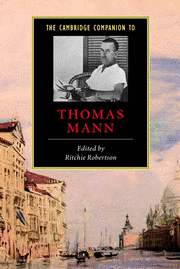Book contents
- Frontmatter
- 1 Mann and history
- 2 The intellectual world of Thomas Mann
- 3 Mann's literary techniques
- 4 Mann's man's world
- 5 Mann's early novellas
- 6 Classicism and its pitfalls
- 7 The political becomes personal
- 8 Buddenbrooks
- 9 The Magic Mountain
- 10 Religion and culture
- 11 Doctor Faustus
- 12 Lotte in Weimar
- 13 The Confessions of Felix Krull, Confidence Man
- 14 Mann as essayist
- 15 Mann as diarist
- 16 Mann in English
- Bibliography
- Index
14 - Mann as essayist
Published online by Cambridge University Press: 28 May 2006
- Frontmatter
- 1 Mann and history
- 2 The intellectual world of Thomas Mann
- 3 Mann's literary techniques
- 4 Mann's man's world
- 5 Mann's early novellas
- 6 Classicism and its pitfalls
- 7 The political becomes personal
- 8 Buddenbrooks
- 9 The Magic Mountain
- 10 Religion and culture
- 11 Doctor Faustus
- 12 Lotte in Weimar
- 13 The Confessions of Felix Krull, Confidence Man
- 14 Mann as essayist
- 15 Mann as diarist
- 16 Mann in English
- Bibliography
- Index
Summary
The perception of Thomas Mann's achievement as a writer and man of letters today rests largely on the relative popularity of his fiction, of his stories and some of his novels. That image has been slightly changed in recent years by the publication of his diaries and of some major new collections of letters, but Mann's prolific work as an essayist of both considerable substance and consummate artistry is little known. His non-fictional prose, written over the first half of this century and covering such subjects as his own life, the theatre (1908) and the German novel, sleep (1909), the artist and the man of letters (1913), the Great War, cosmopolitanism (1925), culture and socialism (1928), the cultural and intellectual climate of the Weimar Republic, many German and European writers and artists, democracy (1938), peace (1938), the problem of freedom and the Second World War (1940), and again major Russian and German figures like Dostoevsky (1946) and Chekhov (1954), Nietzsche (1947) and Schiller (1955) - this vast collection of carefully crafted argumentation is relatively little read. A new annotated German selection of Mann's essays arranged in chronological order in six substantial volumes, the best introduction to Mann the essayist available now, covers barely a third of the estimated six thousand pages of Mann's output. The five volumes of non-fictional writings in the 1974 Fischer edition of Thomas Mann's works give a carefully crafted impression of the nature, range and wealth of his work as an essayist, but not a complete picture of Mann's major and minor essayistic efforts and their varying textual forms. A short introduction to this vast corpus of texts has to subsume them all under a loose definition of the term 'essay'. It also has to explore possible reasons for the controversy surrounding many of them at the time of publication and for their limited influence today.
- Type
- Chapter
- Information
- The Cambridge Companion to Thomas Mann , pp. 213 - 225Publisher: Cambridge University PressPrint publication year: 2001



